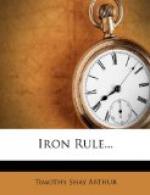“A correspondent of mine writes that he is in business there, and seems to have plenty of money.”
“It is only seeming, I presume,” remarked Mr. Howland.
“He says that he has purchased a handsome piece of property there.”
“It cannot be possible!” was ejaculated.
“I presume that my information is true. Now, my reason for communicating this fact to you is, that you may write to him, and demand, if he have money to invest, that he refund to you a portion of what you have paid for him, and thus save you from the greater difficulties that I too plainly see gathering around you, and out of which I do not think it is possible for you to come unaided.”
“No, sir,” was the reply of Mr. Howland, as he slowly shook his head. “If he have money, it is ill-gotten, and I cannot share it. He owes you, write to him, and demand a payment of the debt.”
“I am willing to yield my right in your favor, Mr. Howland. In your present extremity, you can make an appeal that it will be impossible for him to withstand. He may not dream of the position in which you are placed; and it is due to him that you inform him thereof. It will give him an opportunity to act above an evil and selfish spirit, and this action may be in him the beginning of a better state.”
But the father shook his head again.
“Mr. Howland,” said the other “you owe it to your son to put it in his power to act from a better principle than the one that now appears to govern him. Let him know of your great extremity, and he may compel himself to act against the selfish cupidities by which he is too plainly governed. Such action, done in violence of evil affections, may be to him the beginning of a better life. All things originate in small beginnings. There must first be a point of influx for good, as well as for bad principles. Sow this seed in your son’s mind, and it may germinate, and grow into a plant of honesty.”
Mr. Howland heaved a deep sigh, as he answered—
“This is presenting the subject in a new light; I will think about it.”
“May you think about it to good purpose,” replied the friend, earnestly.
This communication disturbed Mr. Howland greatly. He had too many good reasons for doubting his son’s integrity of character; but he was not prepared to hear of such deliberate and cruel dishonesty as this. It was but another name for robbery—a robbery, even to the ruin of his own father.
“I will demand restitution!” said the old man, impatiently, as his mind dwelt longer and longer on the subject, and his feelings grew more and more indignant. From the thought of any appeal on the ground of humanity, he revolted. It was something entirely out of keeping with his peculiar character. He could not bend to this.
So Mr. Howland wrote a pretty strong letter to his son, in which he set forth in terse language the facts he had heard, and demanded as a right, that restitution be at once made.




